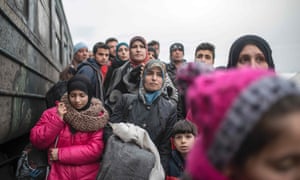Europe’s negotiations about the UK’s membership and about the refugee crisis become entangled at Brussels summit
The Guardian

Migrants and refugees board a train to Serbia from the Macedonian-Greek border on Friday. Photograph: Robert Atanasovski/AFP/Getty Images
Jennifer Rankin in Brussels
Friday 19 February 2016
The discussion surrounding the UK’s future in the European Union has collided dramatically with the migration crisis after Greece threatened to veto a new deal for Britain if other member states closed their borders to refugees.
The two problems became entangled at a summit in Brussels where EU leaders are grappling not only with David Cameron’s negotiations but also with how to deal with the biggest influx of refugees since the second world war.
The movement of people has called into question the EU’s border-free Schengen zone and has thrown EU asylum rules into chaos. On Friday, Austria introduced daily limits on the number of migrants entering the country, triggering fears of further border closures.
EU sources said the Greek government, in the midst of the so-called Brexit summit, had asked for a guarantee from other leaders that no borders would be closed before an EU-Turkey summit to discuss the refugee crisis in early March. Otherwise, it reportedly said, it would withhold approval of the British deal.
“We are asking for a unanimous decision that until [an EU-Turkey summit planned for] March 6, no state will unilaterally close its borders ... if not, the Greek government will not approve the conclusion text”, a source told AFP.
The suggestion threatened to throw the whole summit into confusion, not least because non-EU member state Macedonia, which shares a border with Greece, is not at the gathering. Central European countries – such as Poland, Hungary, Slovakia and the Czech Republic – have been lobbying to seal Macedonia’s border with northern Greece.
In a late-night session on Thursday, European Union leaders promised to step up efforts on a €3bn (£2.33bn) action plan with Turkey aimed at reducing the flow of refugees to Europe.
Vienna placed restrictions on the number of refugees allowed to enter Austrian territory, despite an unusually sharp rebuke from the European commission, which branded the move “plainly incompatible” with international law.
It announced earlier this week it would let no more than 3,200 migrants and refugees into its territory a day, either to travel on to neighbouring countries or apply for asylum, and would introduce a daily limit of 80 asylum claims.
Once the quotas have been reached “the borders will be closed”, a police spokesman, Fritz Grundnig, said. He added that due to bad weather, no migrant or refugee had arrived at the Austrian-Slovenian frontier since Thursday afternoon.
European leaders agreed to press forward on the “full and speedy implementation” of the EU-Turkey action plan that was signed off with Ankara last year, although EU money was only finalised one week ago.
In Brussels, leaders broke off from discussions on the UK’s EU future for a lengthy and sometimes confrontational debate on the refugee crisis. Countries clashed, with criticism levelled at Greece for not doing enough to close its border and Austria for doing too much.
The German chancellor, Angela Merkel, said Austria’s decision “drove home again to us how urgently solutions are needed”. But she added she was pleased progress had been made. “The important statement for me today is that we have not only reaffirmed the EU-Turkey action plan, but we have said it is our priority,” Merkel said.
Merkel at the European summit in Brussels on Friday. Photograph: Isopix/Rex/Shutterstock
The EU will hold a summit with the Turkish government in early March to discuss how to make the action plan work. Turkey’s prime minister, Ahmet Davutoğlu, abandoned plans to meet EU leaders in Brussels on Thursday after a car bomb killed at least 28 people in the Turkish capital on Wednesday.
Turkey, which is hosting at least 2.5 million refugees, is unlikely to be impressed with an official communique by EU leaders criticising its efforts.
Following talks on Thursday night, EU leaders called for a “substantial and sustainable reduction of the number of illegal entries from Turkey” and “further decisive efforts” from it on the action plan.
In the absence of Turkey, EU countries criticised each other for their handling of the migrant crisis. Some leaders also voiced frustration at being forced to spend hours debating the British renegotiation while Europe was struggling to grapple with the refugee crisis.
There’s nascent hope in the Calais ‘Jungle’ camp. So why destroy it?
David Kraft
Read more
The European council president, Donald Tusk, called on countries to “avoid a battle among plans A, B and C. It makes no sense at all because it creates divisions within the European Union.”
International agencies released figures on Friday showing that, on average, two children have drowned every day since September 2015 as their families tried to cross the eastern Mediterranean. The United Nations high commissioner for refugees, the UNHCR children’s charity and the International Organisation for Migration called for governments to take steps to ensure refugees’ safety, such as resettlement and family reunion programmes.
“We cannot turn our faces away from the tragedy of so many innocent young lives and futures lost – or fail to address the dangers so many more children are facing,” Unicef’s executive director, Anthony Lake, said. “We may not have the ability now to end the desperation that causes so many people to try to cross the sea, but countries can and must cooperate to make such dangerous journeys safer. No one puts a child in a boat if a safer option is available.”
No comments:
Post a Comment